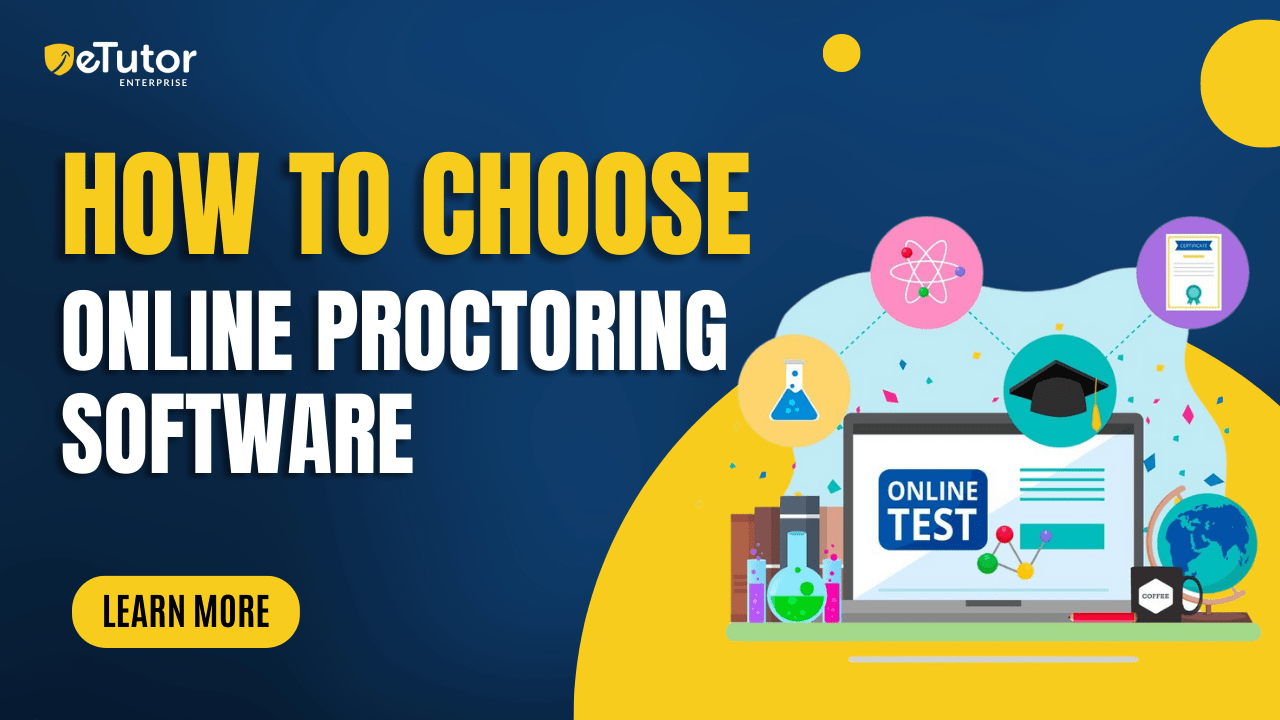Online proctored exams have gained widespread acceptance among educational institutions especially due to the impact of the global pandemic that forced a shift to online learning and assessment. Remote proctoring has emerged as a reliable method for securely conducting exams in this digital age. A study by Educause revealed that 33% of proctoring users are uncertain about what features to look for in a proctoring system and lack familiarity with best practices.
To choose an Online Proctoring Sofware that seamlessly integrates with your Learning Management System (LMS) and aligns with your specific needs, it is crucial to have a comprehensive understanding of essential proctoring capabilities. This blog post highlights key factors to consider when selecting remote proctoring software, aiming to guide you through the diverse landscape of proctoring solutions in the market.
Examining students remotely or through online means requires the employment of proctoring software, which keeps an eye on their identity and conduct. Typically, it records and analyzes the student’s actions during the exam using the webcam, microphone, and screen. Keeping an eye on the student’s face, surroundings, keystrokes, and online activity could be part of the process to spot possible cheating. Additionally, some proctoring software makes use of machine learning and artificial intelligence to spot questionable activity and flag it for human proctors to examine further.
What is Online Proctoring Software?
Online proctoring software is a technology solution designed to facilitate and secure the remote monitoring of exams and assessments conducted over the internet. This type of software ensures the integrity of online exams by employing various tools and features to prevent cheating and maintain a fair testing environment. Online proctoring software typically includes functionalities such as video monitoring, audio monitoring, screen sharing detection, and facial recognition to verify the identity of the test-taker and monitor their behavior during the exam. It is particularly valuable in the context of distance learning and remote education, providing institutions with a means to conduct secure assessments while allowing students to take exams from the comfort of their own locations.
Qualities to Choose the Best Online Proctoring Software?
The best online proctoring platform is based on following parameters. They are:
-
Comprehensive in nature:
A proctoring solution eliminates the need for investing in multiple tools, streamlining the online testing process. The hosting of tests online should be simplified without the complexity of dealing with various software. An effective proctoring program should offer universities and institutions a one-stop solution for their online examination needs. With a unified software platform, educational institutions should be able to conduct online exams globally, automate exam scheduling, facilitate various types of tests (such as Multiple-Choice, Essay, Viva, etc.), efficiently score assessments, and ensure the integrity of exam results. For instance, certain exam proctoring software combines online exam hosting with video interviewing capabilities. This not only enables the administration of online assessments and oral exams through live video but also ensures the prevention of cheating by allowing administrators to monitor students’ activity during the test – all through a single, integrated platform.
-
Scalable:
An exceptional online proctoring service must demonstrate the capability to manage large-scale tests efficiently. Whether it’s school or university exams with tens to thousands of participants or certification exams for candidates worldwide, the proctoring software should seamlessly handle tests on a significant scale. A robust scheduling system is essential to accommodate time differences and ensure exams are conducted at convenient times for candidates.
-
Easy Integration:
When selecting proctoring software, consider its ability to integrate with your existing technology stack. The software’s quality and effectiveness are not the sole determinants of success; compatibility with Learning Management Systems (LMS) is equally crucial. Confirm that the chosen proctoring program seamlessly integrates with your LMS, as this ensures a smoother overall educational technology infrastructure.
-
User Experience:
The transition from offline to online proctoring should prioritize a satisfactory user experience for both administrators and students. An intuitive proctoring program automates the exam process, ensuring efficiency while maintaining a smooth experience. It should not only meet exam standards and save time but also offer a non-intrusive interface. Platform robustness is key, incorporating features such as video streaming, desktop sharing, secure browser usage, and the ability to restrict specific actions or websites, contributing to a seamless online proctoring experience.
-
Exam Customization:
Look for software that allows customization of exams to meet your specific needs. This may include options for different question formats, time limits, and adaptive testing capabilities.
-
Customer Support:
Evaluate the availability and responsiveness of customer support services. A reliable support system can be crucial in resolving technical issues promptly and ensuring a smooth examination process.
Conclusion:
Selecting the best online proctoring software involves a careful consideration of security features, customization options, accessibility, and integration capabilities. By focusing on these qualities, you can ensure a fair, secure, and efficient online examination process. Additionally, exploring synergies with platforms like eTutor Online Exam Software can elevate the overall educational experience for both educators and students alike.



